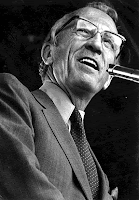The only province yet to do in the Greatest Premier contest is the
nation.
Chuckercanuck has set up a poll at his site, with voting open until Saturday. Since Quebec has never been blessed with a
neocon or
NDP Premier, this one might avoid the usual
freeping we saw in other provinces. So I encourage everyone to cast their vote (
warning: if you live in a highly anglophone riding, your vote may be deemed to be spoiled for no apparent reason).
The FieldPierre Joseph Olivier Chauveau (1867-1873): After doing a lot for education in the province
pre-1867,
Chauveau became Quebec's first Premier as the "
consensus choice" between English protestants and French catholics. From the sounds of things,
Chauveau had a tough run as Premier, with a lot of the best talent off helping John A in Ottawa, and the warring religious factions at home making compromise difficult on most issues. After six years,
Chauveau decided he needed to do something a lot less stressful and resigned to become speaker of the Senate.
Lomer Gouin (1905-1920): Most famous for
Gouin Street, Sir
Lomer had a pretty
good run as Premier, winning four elections. As Premier, he got increased funding from Ottawa, extended Quebec's borders northward, and presided over fairly strong economic growth. With the economy going strong,
Goin paid down the debt, improved education, and had a massive push on infrastructure in response to that new
fangled "car". On the social front, he opposed conscription (duh), brought in prohibition (damn), and denied women the vote (d'oh). Despite being a pretty good Premier and a worthy winner,
Lomer's currently polling at 0% over at
Chucker's site.
Maurice Duplessis (1936-39; 1944-59): In a recent biography, Conrad Black tried to save
Duplessis' reputation which probably tells you all you need to know about
Duplessis.
Duplessis' authoritarian reign in Quebec is often
referred to as "La
Grande Noirceur". He gerrymandered the electoral map, restricted freedom of the press and, by and large, staled Quebec's development as province.
Deplessis' "winning coalition" that kept him in power was the rural parts of the province, US business, and the Catholic Church, and he
shamelessly pandered to all three groups.
Jean Lesage (1960-66): I voted for
Lesage, although he certainly didn't have a lengthy career as Premier, and I could probably be persuaded to move my vote somewhere else.
Lesage's win in 1960 was a key moment in the Quiet Revolution, ending the Union
Nationale's reign. He was subsequently re-elected in '62 under the "
Maîtres chez nous" slogan (loosely translated to "
master of the house" or "
master of his domain"). He was defeated in 1966 because, to be blunt, he was too stupid to redraw the old UN
Nationale rural heavy electoral map. During his time as Premier,
Lesage brought in massive reform to education, health care, and working conditions. He also nationalized Hydro-Quebec.
Daniel Johnson Sr. (1966-68): Not to be confused with his son who nearly lost the '95 Referendum. Johnson, like virtually
every Quebec Premier made his position in the federation clear with his election slogan:
Égalité ou indépendance. I'm really not sure what he did during his time in Premier except get beaten around by Trudeau at a First Ministers meeting, which set Pierre up as the guy who will "stand up to Quebec" in the eyes of many future Liberal delegates to the '68 convention.
Robert Bourassa (1970-76; 1985-94): The early leader in
Chucker's poll.
Bourassa's biggest accomplishment during his first kick at the can was to massively expand Hydro-Quebec through the James Bay project. His performance reviews on the October Crisis are usually weak, and he started Quebec on the road to Bill 101, with his Bill 22.
Bourassa returned to power in '85, and grabbed headlines on the national stage during this time for his use of the Notwithstanding Clause, and ventures into the
Meech and Charlottetown debates.
Rene Levesque (1976-1985): Levesque would certainly be an interesting and, perhaps not completely undeserving winner, if he took this contest. A
successful Cabinet Minister under
Lesage, the former journalist founded the
PQ in 1968. Levesque is obviously most famous for Bill 101 and the 1980 referendum, but his influence on the province wasn't limited to the separatist movement. His campaign finance laws were decades ahead of their time, and his government was the first to prohibit discrimination based on sexual orientation. He moved social services from the church to the state, and completed the nationalization of Hydro-Quebec.
Lucien Bouchard (1996-2001): Undeniably one of the best politicians to come out of Quebec but the best Premier? That's a stretch. After a colourful career in Mulroney's Cabinet, the Bloc Quebecois, and the head honcho during the '95 referendum,
Bouchard was acclaimed Quebec Premier when
Parizeau, well, you know - went insane following the 1995 Referendum result. As Premier,
Bouchard brought in the popular daycare program, cut health care, and balanced the books (kinda). However, his refusal to go hard line on the separation question, led to his removal as party leader in 2001.
Jean Charest (2001- not much longer): Another former Mulroney Cabinet Minister who was acclaimed his party's saviour but didn't really live up to the hype. The verdict is still out but
Charest's term was certainly far from
successful.
Polls close tomorrow so be sure to
get out and vote!
Labels: Best Premier







































